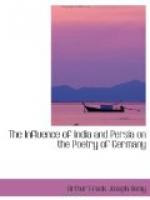[65] Ibid. ii. p. 1004.
[66] Ed. by Felix Bobertag, KDNL. vol. 37, Einl. p. 8.
[67] On this see Felix Bobertag, Gesch. des Romans und der ihm verwandten Dichtungsgattungen in Deutschland, Bresl. 1876, vol. ii. 2. pp. 110 seq., 140, 160.
[68] In Der abenteuerliche Simplicissimus ed. Adalb. Keller, Stuttg. 1862 (BLVS. vol. 66), vol. iv. pp. 707 seq.
[69] Op. cit. pp. 759, 760.
[70] Ibid, p. 710; again p. 841.
[71] The Story of Joseph from the Quran was published in Arabic with a Latin version by Erpenius as early as 1617. See Zenker, Bibl. Orient., Leipz. 1846, vol. i. p. 169, No. 1380.
[72] Keller, op. cit. p. 742.
[73] See Jackson, Zoroaster, Appendix V (by Gray).
[74] See Jackson, Zoroaster, pp. 127-132.
[75] Rud. Fuerst, Die Vorlaeufer der Modernen Novelle im achtzehnten Jahrhundert, Halle a. S. 1897. p. 51.
[76] Some of the stories are undoubtedly Oriental in origin. The work appeared at Venice, 1557, and was translated into German, in 1583, by Johann Wetzel under the title Die Reise der Soehne Giaffers. Ed. by Herm. Fischer and Joh. Bolte (BLVS, vol. 208), Tueb. 1895.
[77] Fuerst, op. cit. p. 52. The name is derived from the Arabic [Arabic] “speaker of the truth,” as pointed out by Hammer in Red. p. 326. See essay L’ange et l’hermite by Gaston Paris in La Poesie du Moyen Age, Paris, 1887, p. 151.
[78] Fuerst, op. cit. p. 154.
CHAPTER III.
HERDER.
Herder’s
Interest in the Orient—Fourth Collection
of his
Zerstreute Blaetter—His
Didactic Tendency And Predilection For
Sa’di.
The epoch-making work of the English Orientalists, and above all, of the illustrious Sir William Jones, at the end of the eighteenth century not only laid the foundation of Sanskrit scholarship in Europe, but also gave the first direct impulse to the Oriental movement which in the first half of the nineteenth century manifests itself so strikingly both in English as well as in German literature, especially in the work of the poets. In Germany this movement came just at the time when the idea of a universal literature had taken hold of the minds of the leading literary men, and so it was very natural that the pioneer and prophet of this great idea should also be the first to introduce into German poetry the new west-oestliche Richtung.
Herder’s theological studies turned his attention to the East at an early age. As is well known, he always had a fervid admiration for the Hebrew poets, but we have evidence to show, that, even before the year 1771, when Jones’ Traite sur la poesie orientale appeared, he had widened the sphere of his Oriental studies and had become interested in Sa’di.[79] Rhymed paraphrases made by him of some stories from the Gulistan date from the period 1761-1764,[80] and, as occasional references prove, Sa’di continued to hold his attention until the appearance, in 1792, of the fourth Collection of the Zerstreute Blaetter, which contains the bulk of Herder’s translation from Persian and Sanskrit literature, and which therefore will have to occupy our attention.[81]




